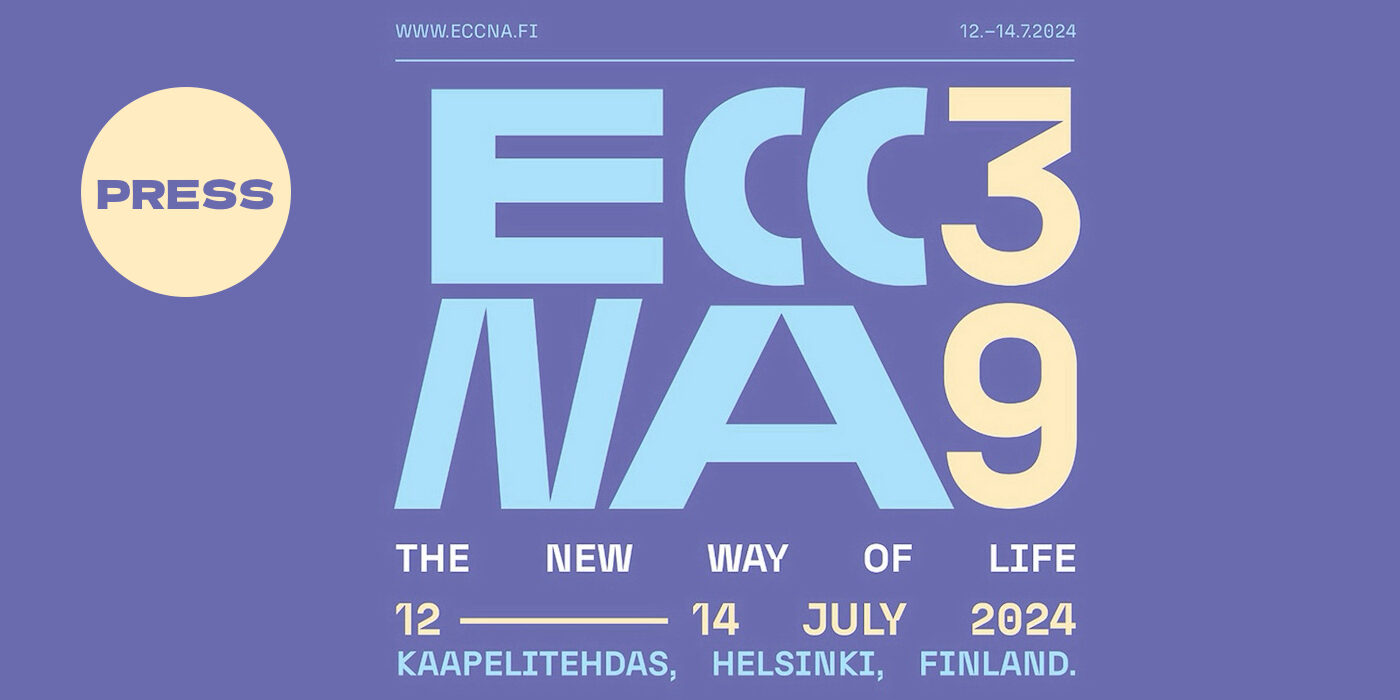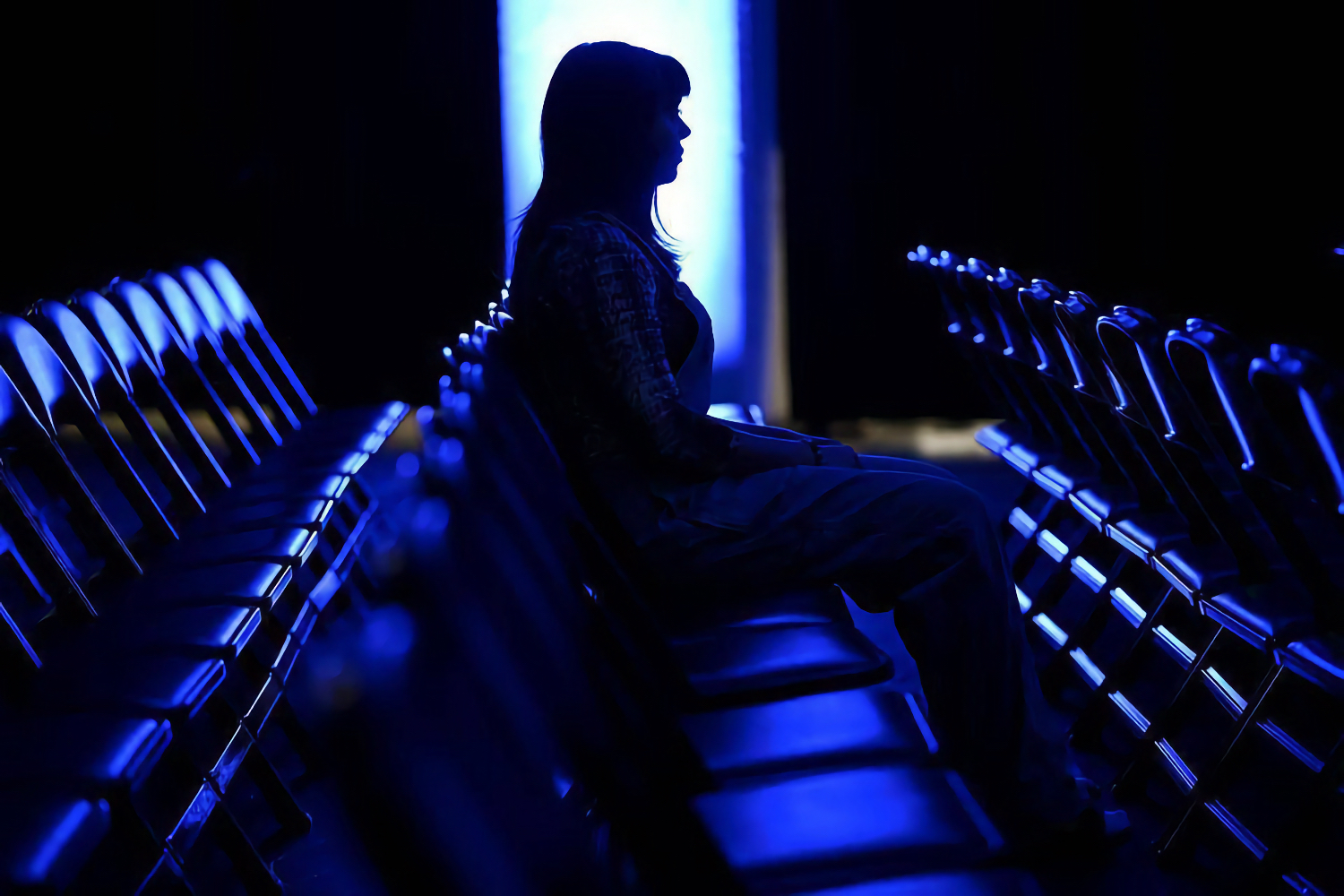Press Coverage ECCNA 39
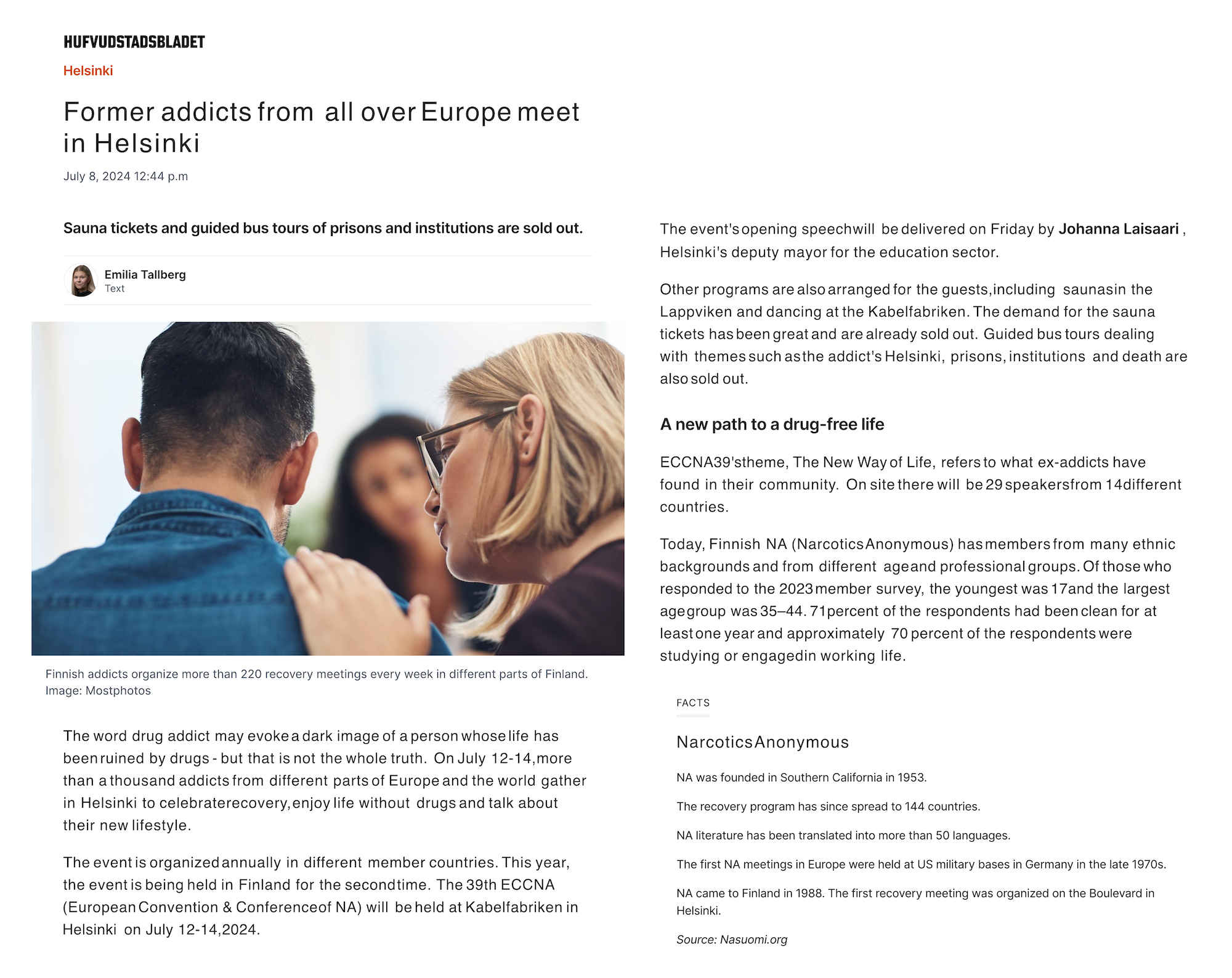
Source: www.hbl.fi
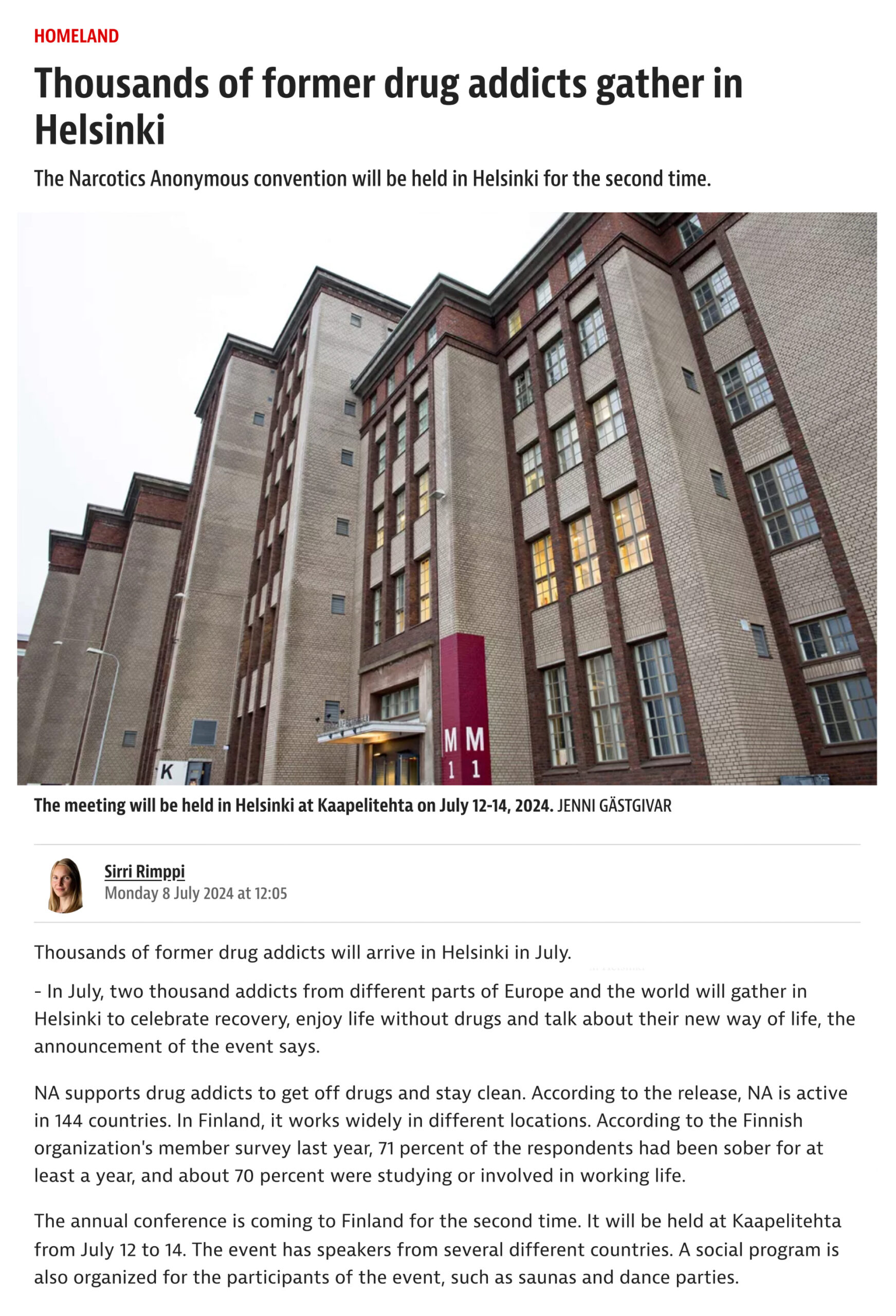
Source: www.iltalehti.fi
Media Posts all over Finland Media
Sanni used drugs, became depressed and accepted death.
“I was prepared for the fact that drug use might kill me“
„One day something happened, and I decided that I do want to live after all.“
Twenty-year-old Helsinki resident Sanni used substances from a young age, according to her own words, “quite typically”, until a drugs came along and she became addicted. Drug use became a daily occurrence. According to Sanni, however, she strongly denied the problem.
„I became so depressed that I was ready to accept that using drugs might kill me at some point. I had accepted it because I didn’t want to stop.“
STT interviewed Sanni at the convention of the Narcotics Anonymous fellowship of recovering drug addicts in Helsinki. The organization’s operating principles include anonymity, and none of the interviewees in this story appears by their real name.
Narcotics Anonymous (NA) was founded in the United States in the 1950s, but currently operates in more than 130 countries. According to a member survey conducted by the Finnish branch last year, more than 40 percent of the participants had used drugs for 11–20 years. Almost 50 percent had joined through a treatment facility and about 30 percent through another member. There are slightly more men than women in the membership.
There is Hope in Humanity
When Sanni decided to stop all substance use, she did it without help. Previous attempts to quit made her realize that she also have to give up alcohol and cannabis. She went five months without using anything, but then started using again. At this point, Sanni found Narcotics Anonymous and realized that she was an addict.
„I had such a strong desire to quit that I don’t want this anymore. Many months passed by the force of that desire. I was a bit like intoxicated by the new feeling that I had survived.“
Sanni kept her drug use a secret from her close circle. She says that very few people would have guessed from the outside that she has a serious drug problem.
„When I came out to my close circle about my drug problem, no one had suspected it.“
However, Sanni did not have a support network before joining Narcotics Anonymous. According to her, a genuinely caring and loving community was something she had longed for in her life even before she started using drugs. Now, Sanni has been involved for about a year and a half and feels like she belongs somewhere.
There are many prejudices associated with drug users. Sanni hopes that people will understand that addiction is a disease, not a weakness of character.
„It can happen to anyone. It can be your daughter or your father. That should be kept in mind if you want to judge another person,” Sanni says.
Sanni also suggests that policymakers should think about how they talk about drugs, about drug users.
“I can say as someone who has been deeply addicted to drugs that in that state, you already hate yourself enough without someone else coming and saying that you are the scum of society.”
Addiction and Recovery
James, who has had a successful career in the music business in the United States and now lives in Los Angeles, shares that it was not unusual to use drugs within the music scene. He used hard drugs because he liked the feelings they provided.
“I could predict how I would feel at two o’clock on Monday, seven o’clock on Friday, on vacation, or on my birthday. I wanted to control my emotions—I just wanted that one feeling that came from using.”
He has been involved with Narcotics Anonymous for decades and traveled to Finland to meet his friends at a convention.
James comes from a good family, so to speak. His childhood included tennis camps and riding lessons. The family was religious, and James did not rebel against his family’s values. But one day a friend noticed James was tired and offered him something to do about it. James took it in both nostrils.
“It was Tuesday then. By Friday, I was using every day.”
James was making good money and doing well. He had enough money to buy drugs. However, eventually, they started affecting his ability to work.
“The use wasn’t a problem until it became a problem,” James says.
Lured by a friend, James attended a meeting for substance abusers, which his father had also attended. He didn’t get much out of the meeting and went to the next NA meeting. There, he heard stories of addiction from people who looked different from him and had completely different backgrounds. Nevertheless, he heard others echoing his own internal feelings.
Through the meetings, he was able to break free from substance abuse. Melvin, who attended the meetings, helped him with his recovery, saying that he could call him anytime. James was skeptical but called him during a difficult moment and reached Melvin at two o’clock in the morning.
“When people get involved in the program, it is said that everyone has two things in common: addiction and recovery.”
Possessions in Two Plastic Bags
The experiences of others also resonated with Sakari, a man in his forties who started attending NA meetings while in detox treatment. Sakari had initially thought that meetings weren’t for someone like him. He believed that the group was for people struggling severely with addiction.
“At my first meeting, there was a man with his wife, and I identified with his experiences. I realized that there are people here like me. The man left the parking lot in a fancy car, which shattered my prejudice. It made it easier to relate, as I also drove up in a Range Rover to the meeting.”
Sakari began using drugs when he turned eighteen and ended up in prison about six years later. All the crimes he committed were related to substances. Initially, he had a home and a job, but he lost them.
“In prison, all my possessions were in two plastic bags.”
A Chance to Prove Himself
After prison, Sakari worked but continued using drugs for about ten years. He started a business with a partner.
„If I’d been working for someone, I’d have been fired a long time ago. Colleagues saw me confused.“
Eventually, the partner suggested selling the company so that Sakari could “keep on messing around“ in peace. His wife also said she had had enough. At the time, Sakari had two-year-old son. For the first time, he ended up on a break with his partner and his wife.
“I thought that once they calmed down a bit, I could go back to something.”
Sakari says he attended an NA meeting after a substance abuse counselor persistently suggested he should. According to Sakari, it changed his life. However, it was harder for others to believe in this change because Sakari had long assured his close circle that he would quit substances.
„I had promised my wife that it would be the last time, and I wouldn’t do it again. That’s when I had to prove myself to others,“ Sakari says.
After Sakari had been clean for five years, the wife said that now Sakari is the same person, the man she met when she was young. Sakari has now been involved with NA for over 10 years.
“I had to come by myself and find myself again. The biggest things for me have been finding joy in small things and freedom, discovering my own boundaries, and changing my criminal mindset.”
Heli Laakkonen
- Source: www.savonsanomat.fi
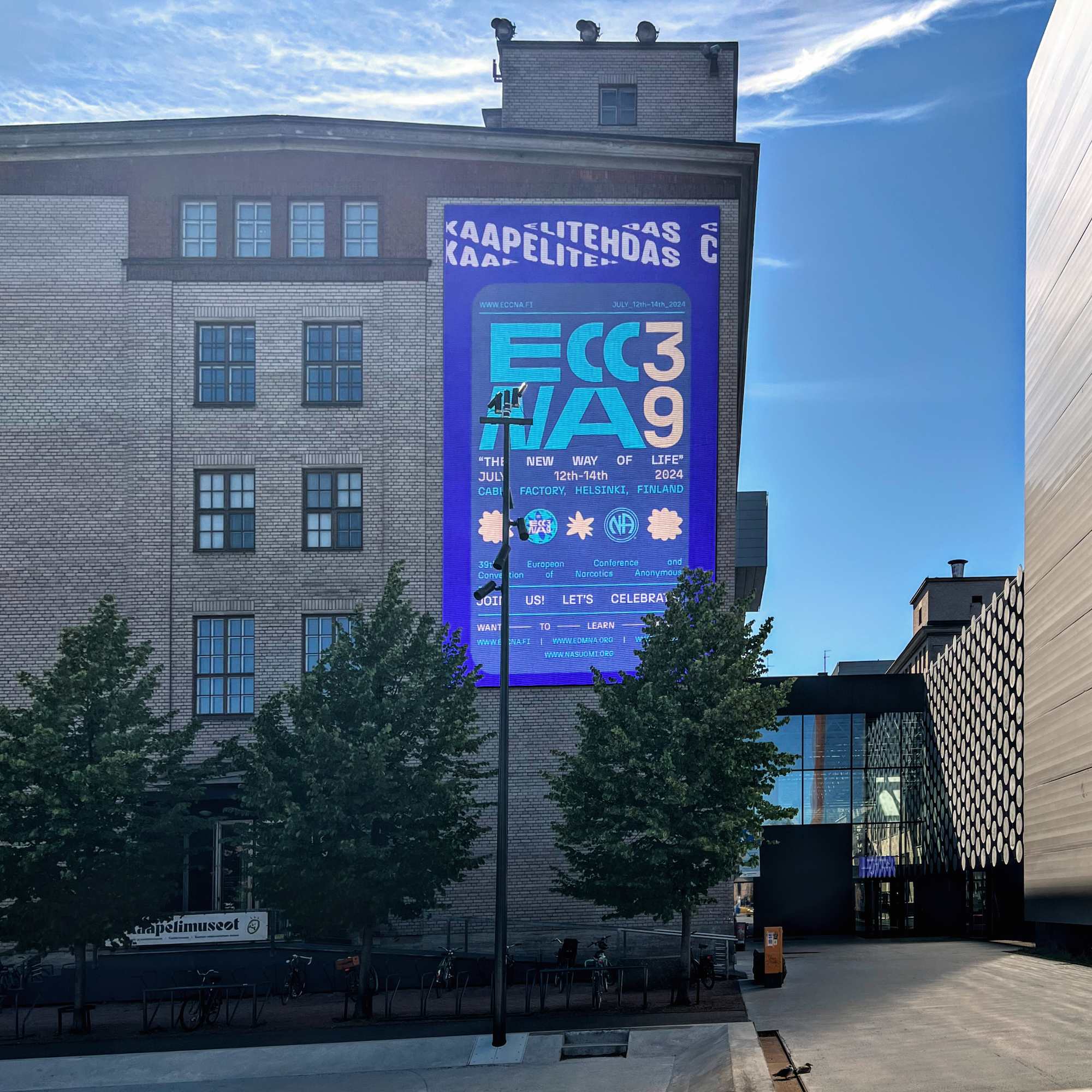 ECCNA 39 Helsinki at Kaapelitehdas
ECCNA 39 Helsinki at Kaapelitehdas

